

Entrepreneurship - advantage, percentage, type, Entrepreneurship defined, The entrepreneurial personality. Photo by: Stephen VanHorn An entrepreneur is one who organizes a new business venture in the hopes of making a profit.
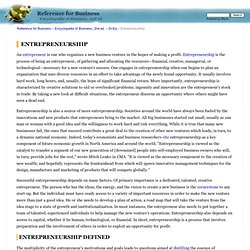
Entrepreneurship is the process of being an entrepreneur, of gathering and allocating the resources—financial, creative, managerial, or technological—necessary for a new venture's success. One engages in entrepreneurship when one begins to plan an organization that uses diverse resources in an effort to take advantage of the newly found opportunity. It usually involves hard work, long hours, and, usually, the hope of significant financial return. More importantly, entrepreneurship is characterized by creative solutions to old or overlooked problems; ingenuity and innovation are the entrepreneur's stock in trade. Entrepreneurship is also a source of more entrepreneurship. Successful entrepreneurship depends on many factors. The multiplicity of the entrepreneur's motivations and goals leads to questions aimed at distilling the essence of entrepreneurship.
Lenko, Mitch. The Saviour Of Entrepreneurship? The Scouts… Jerry Kaplan, Winster - Five Critical Skills That Entrepreneurs Need. Video Library - Lester Center for Entrepreneurship. Welcome to the Lester Center video library.
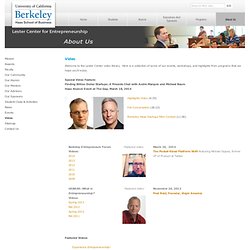
Here is a collection of some of our events, workshops, and highlights from programs that we hope you’ll enjoy. Special Video Feature: Finding Billion Dollar Startups: A Fireside Chat with Andre Marquis and Michael Baum Haas Alumni Event at The Gap, March 18, 2014 Highlights Video (4:35) Full Conversation (28:22) Berkeley-Haas Startups Pitch Contest (11:00) Featured Videos Experience Entrepreneurship! Check Out the Berkeley Entrepreneurs Forum!
Learn about the 2013 T2MA Experience in 3 Minutes Lifetime Achievement Award winner Moshe Alafi Berkeley-Haas Company PACT uses Clothes as a Tool for Good. Lifestyle Entrepreneurs – Statistics for Next Generation Leaders « Balanced Lifestyle Entrepreneurs Network. Lifestyle Entrepreneurs are entrepreneurs who all have something in common.They believe that their lifestyle is as important as financial results.
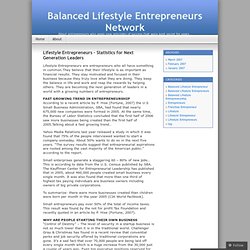
They stay motivated and focused in their business because they truly love what they are doing. They keep the balance in life and work and reap the rewards by helping others. They are becoming the next generation of leaders in a world with a growing numbers of entrepreneurs. FAST GROWING TREND IN ENTREPRENEURSHIPAccording to a recent article by P. 50+ Entrepreneurs. Are you nearing retirement and exploring new opportunities?
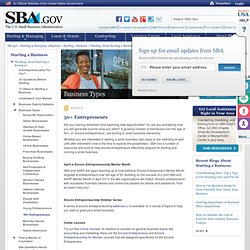
Or, are you wondering how you will generate income once you retire? A growing number of individuals over the age of 50+, or “encore entrepreneurs”, are turning to small business ownership. Whether you are interested in starting a small business right away or are intending to wait until after retirement, now is the time to explore the possibilities. SBA has a number of resources and tools to help encore entrepreneurs effectively prepare for starting and running a small business. April is Encore Entrepreneurship Mentor Month SBA and AARP are again teaming up to host National Encore Entrepreneur Mentor Month targeted at entrepreneurs over the age of 50.
Social Entrepreneurs Turn Business Sense to Good. As charitable giving dries up, new kinds of leaders are taking on the world's problems, using the for-profit world as a model As chief executive of Mercy Corps since 1994, Neal Keny-Guyer helped turn the Portland (Ore.) relief organization into a global powerhouse with 3,500 employees and a budget of nearly $300 million.
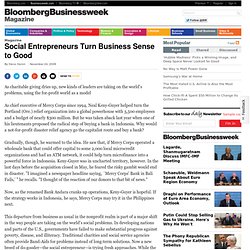
But he was taken aback last year when one of his lieutenants proposed the radical step of buying a bank in Indonesia. Why would a not-for-profit disaster relief agency go the capitalist route and buy a bank? Gradually, though, he warmed to the idea. He saw that, if Mercy Corps operated a wholesale bank that could offer capital to some 2,000 local microcredit organizations and had an ATM network, it could help turn microfinance into a powerful force in Indonesia.
Now, as the renamed Bank Andara cranks up operations, Keny-Guyer is hopeful. The idea of the social entrepreneur has been percolating for decades, but it has become a mass movement in the past couple of years. The Success of Persistent Entrepreneurs. When it comes to entrepreneurship, nothing says success like a track record of previous wins.
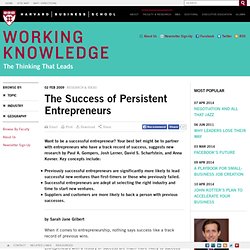
Entrepreneurs with a history of success are much more likely to succeed in new ventures than first-timers or those who failed previously, new research from Harvard Business School demonstrates in the working paper, "Performance Persistence in Entrepreneurship" [PDF]. The news that successful experience, or performance persistence, pays off may not be news at all. But HBS researchers were surprised at just how much it does help. Successful entrepreneurs in the study had a 34 percent chance of succeeding in their next venture-backed firm, compared with 23 percent for those who previously failed and 22 percent for first-timers. "The size of the effect more than anything was surprising," note HBS professors Paul A. Their research, conducted with HBS professor David S. Sarah Jane Gilbert: Can you explain the concept of "performance persistence" and what it entails?
The 9 Personality Types of Entrepreneurs. Starting and growing your own business requires many skills to be successful.
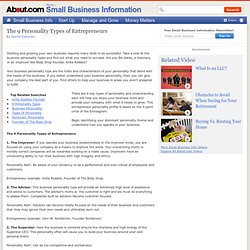
Take a look at the business personality types and find out what you need to succeed. Are you Bill Gates, a Visionary, or an Improver like Body Shop founder, Anita Roddick? Your business personality type are the traits and characteristics of your personality that blend with the needs of the business. If you better understand your business personality, then you can give your company the best part of you. Find others to help your business in areas you aren't prepared to fulfill. There are 9 key types of personality and understanding each will help you enjoy your business more and provide your company with what it needs to grow.
Begin identifying your dominant personality theme and understand how you operate in your business. What type of entrepreneur are you? What type of entrepreneur are you?
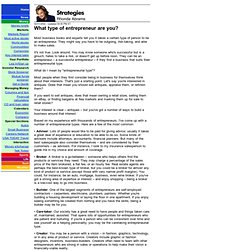
Most business books and experts tell you it takes a certain type of person to be an entrepreneur. They might say you have to be outgoing, risk-taking, and able to make sales. It's not true. 6. Types of Entrepreneurs. The Entrepreneur vs. The Strategy Consultant. The Entrepreneur is very different from the typical McKinsey-esque strategy consultant.
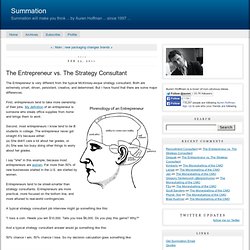
Both are extremely smart, driven, persistent, creative, and determined. But I have found that there are some major differences. First, entrepreneurs tend to take more ownership of their jobs. My definition of an en trepreneur is someone who steals office supplies from home and brings them to work. And a typical strategy consultant answer would go something like this: 50% chance I win, 50% chance I lose.